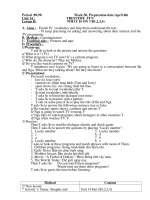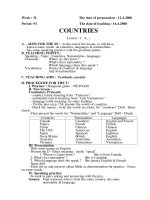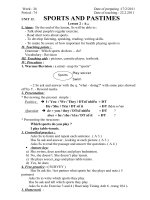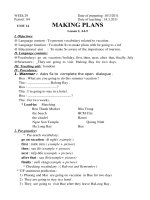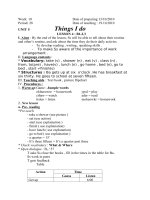Giáo án anh văn 10
Bạn đang xem bản rút gọn của tài liệu. Xem và tải ngay bản đầy đủ của tài liệu tại đây (1.75 MB, 232 trang )
Week : 01
Period : 01
Date : 5/9
`
I/ OBJECTIVES
By the end of the lesson Ss are able to review some tenses: simple past, simple present,
present perfect, past perfect… And then do the exercises.
II/ TEACHING METHODS
Communicative method.
III/ TEACHING AIDS
Grammar in use, Blackboard
IV/ NEW LESSON: REVIEW
Stages Teacher’s activities Students’ activities
Grammar
Exercises
- Asks Ss to remind some
grammatical points
• SIMPLE PRESENT:
S+DO/DOES+V(bare inf)
S+V(s/es)
DO/DOES+S+V(bare inf)……..?
• SIMPLE PAST:
S+V(ed/v2)
S+DID+NOT+V(bare-inf)
DID+S+V(bare inf)……?
• PRESENT PERFECT
S+ have/ has + PP
S+ have/has + not + PP
Have/ Has + S + PP?
• PAST PERFECT
S + had + PP
S+ had not + PP
Had + S + PP?
- Provides Ss the exercises in the
paper.
SUPPLY THE CORRECT FORM OF
VERBS
1.By the time he arrived, all his
classmates(leave)
2.I(meet) ARTHUR three weeks ago
- Work individually.
- Individual work.
HOMEWORK
3.She (be) born in 1980
4.What you (do) at 6.p.m yesterday?
5.He (write) a book since last year
6.The bell(ring) while Tom (take) a bath
7. What you (do) yesterday?
8. Before she (watch) TV, she (do) her
homework last night.
9. Hurry up! The train (come)
10.Up to now, the teacher (give) our class
5 tests
- Asks Ss to work in pairs to do the
exercise.
- Asks Ss to present the answers in front
of the class.
- Corrects Ss’ mistakes
- Work in pairs.
- Some Ss present. Others
listen to.
- Listen to the teacher.
- Prepare the new lesson
Week : 01
Period : 02
Date : 6/9
I/ OBJECTIVES:
- Help Ss be able to talk about their daily routines by learning a typical day of a farmer.
- Help students develop reading skill.
II/ TEACHING METHODS:
Repetition, role play , communicative
III/ TEACHING AIDS:
Chalk, blackboard, English book, pictures about farmers and field work …
VI/ NEW LESSON: UNIT1/ LESSION 1 / READING
Teacher’s activities Students’activities
- Gives Ss handout and introduce the way
to do it. Match a line in A with a place of
work.
A B
1.Teacher a. Field
2. doctor b. school
3. worker c. hospital
4. farmer d. factory
- Puts the questions, calls Ss to answer.
Where does a teacher/doctor… work?
- Leads to the new lesson: Today we are
going to read two passages about a day in
the life of two farmers.
-Requires Ss to ask and answer the
questions
1. What time do you…?
2. What do you often do…?
-Goes around, helps Ss.
- Look at the handout.
-Answer by themselves.
-Listen to the teacher
-Work in pairs
-Calls two Ss to practise again.
-Asks Ss to read the text and show the new
words, the structure.
-Writes the new words on the board.
• NEW WORDS
-alarm(n)
-buffalo(n)
-plot of land (n) small piece of land
-plough and harrow (v)
- fellow peasants (n)
- take a short rest (v)
- transplant (v) grow rice
-Be contented with
- Supplies the structure:
* It+takes/took+o+time+to inf
- Reads the new words
- Asks Ss to give the meaning of the new
words and read them
- Asks Ss to read the passages individually
and choose the option A, B or C.
- Goes around the class and helps Ss.
- Calls on some Ss to read aloud their
answers.
TASK2
- Ask Ss to work in pair and ask and
anwser about the passages
- Goes around the class and helps Ss
- Calls on some pairs to do the task in
front of the class.
TASK3
- Ask Ss to scan the passage and make a
brief note about Mr. Vy and Mrs. Tuyet
daily routines.
- Goes around and offer help.
- Tells Ss to compare their notes with a
friend.
(After you read)
- Ask Ss to work in groups and talk
- Two Ss practice again, Others listen.
-Read the passage in silent and point out the
new words
- Write down.
- Give meaning
- Copy down
- Listen to teacher and read again
- Do task 1 by himself
- Some Ss read aloud the answers.
- Work in pairs
- Some pairs practise again. Others listen
to.
- Pair work
about Mr. Vy and Mrs. Tuyet daily
routines.
- Goes around and provides help.
- Calls on some Ss to give a short talk
about the daily routines if these two
farmers.
IV/HOMEWORK
- Compare the notes with a friend
- Work in groups
_ Some Ss give a short talk. Others listen to.
- Learn by heart new words
- Prepare the new lesson
Week : 01
Period : 03
Date : 7/9
I/AIMS:
Help students ask and answer something about their daily routine. By the end of the
lesson, student will be able to talk about his or her daily routine by using given
information and pictures.
II/ TEACHING METHODS:
Communicative, role play, repetition
III/TEACHING AIDS:
Textbook, blackboard, chalk, small cards of class timetable, …
IV/ NEW LESSON: UNIT1 / LESSON2 / SPEAKING
Stages Teacher’s activities Students’ activities
WARM-UP
Activity1
Activity2
TASK1
- Says: Make a list of the subjects
you learn at school.
- Is able to supply the subjects
which Ss can’t.
- Asks Ss to repeat the subjects
after the teacher.
- Hangs the chart on the board
and says: Match a number in A
with a suitable phrase in B
A
B
7.15 a. a quarter to ten
8.05 b. five to nine
8.55 c. five past eight
9.45 d. a quarter past seven
10.40 e. twenty to eleven
17.00 f. half past six p. m
6.00 g. five o’clock p. m
18.30 h. six o’clock a. m
- Asks Ss to work in pairs to match a
number in A with a suitable phrase in
B.
- Calls some Ss to present the
keywords on the board.
- Says: Quan is a tenth grade student.
He goes to school every morning.
Now, look at his weekly timetable ask
and answer questions by using the
- Haven’t opened the book
yet.
- Listen to the teacher.
- Repeat after the
teacher
- Listen to the teacher’s
requirement
- Work in pairs
- Some present the answers.
- Listen to the teacher.
TASK2
TASK3
Home work
information from the timetable.
- Asks Ss to read Quan’s weekly
timetable and do the task.
- Asks Ss to do the task in pairs.
- Goes around and helps Ss.
- Calls on two pairs to practise in front
of the class.
- Divides the class into 04 groups.
- Calls on representative of each
group present in front of the class.
- Asks Ss to study the pictures
carefully and then describe them in
English
- Goes around and helps Ss
- Asks Ss to practice in groups,
describe Quan’s activities during the
day.
- Asks Ss to work in pairs talk about
their daily routine and notes to Ss only
talk about the important activities.
- Goes to different pairs and offers
help if necessary.
- Calls on some good Ss to present in
front of the class
- Read QUAN’s weekly
timetable individually.
- Ask and answer in pairs
- Two pairs practice in front
of the class.
- Work in groups, write on
the waste papers
* Group 1 – Picture a & b
* Group 2 - Picture c & d
* Group 3 - Picture e & f
* Group 4 - Picture g, h & i
- Each group presents in
front of the class.
- Work in pairs.
- Work in groups.
- Work in pairs
- Some good Ss tell their
classmates about his/her
daily routine.
-Practice speaking skill at
home and prepare the new
lesson.
Week : 02
Period : 04
Date : 9/9
I/ OBJECTIVES
After the lesson, students will be able to:
. Talk about a day in the life a cyclo driver.
. Improve listening skill by doing pictures ordering and True or False exercises.
II/ TEACHING METHODS
Communicative,
III/TEACHING AIDS
Pictures, Textbook, cassette
IV/ NEW LESSON: UNIT1 / LESSON3 / LISTENING
Stages Teacher’s activities Students’ activities
Warm
– up
- Hangs out the picture of a
man who drives a cyclo
and introduces:
• He has a cyclo
• He works in the streets
• He drives people from one
place to another
- Puts a question:
• Who is he?
- Lists to the new lesson:
Mr. Lam is a cyclo driver.
He is working in HCM
city. Let’s guess his
routine. What does he do
in his job?
- Puts questions in page 16
- presents some new words
by setting a situation,
giving synonym, or antonym
* key words:
-district(n)
-routine(n)
-pedal(n)
-Look at the picture
-Listen to the teacher
-Answer the question
-Listen to the teacher
-Answer the questions
- guess what the word is and then
copy down.
While
you
listen
TASK1
TASK2
After
you
liste
Home
work
-purchase(v)=buying
- food stall(n)
- drop (v)
- Asks Ss to open their books.
Base on the pictures, Describe
about Mr. Lam’s daily routine in
English.
- Goes around checking and
helping Ss.
- Plays the tape several times
- Stops playing the tape for each
sentence which justifies to the
picture for Ss to check the
keyword
- Plays the tape again and asks Ss
to listen and describe whether
the statements are True or False.
- Stops playing the tape for each
sentence and then calls on some
Ss to explain their answer.
- Gives the correct answer
- Tells Ss to work in pairs ask and
answer questions about Mr. Lam
activities by using the cues.
- Goes around the class and
offers the help if necessary
- Calls on some pairs ask and
answer in front of the class.
-Work in pairs and have guesses
about Mr. Lam’s routine.
- Listen to Mr. Lam’s talk and
number the pictures in their
correct order.
- Compare the answers with
his/her friend
-Read the statements carefully.
-Listen to the tape
-Some Ss explain the answers,
others listen.
- Work in pairs
- Some pairs practice asking
and answering in front of
the class.
- Prepare the new lesson.
-Learn by heart the old lesson
Week : 02
Period : 05
Date : 10/9
I/AIMS
Help Ss understand about the content, language and structure of writing a narrative .
Moreover, by the end of the lesson Ss will be able to write a narrative by using given
prompt.
II/TEACHING METHODS
Communication method.
III/TEACHING AIDS
English book, chalk, blackboard
IV.NEW LESSON: UNIT1 / LESSON 4 / WRITING
Steps Teacher’s activities Students’ activities
Warm –
Up
Activety
1
TASK1
- Puts some questions and
writes them on the board.
1. Have you ever heard a
freightening story?
2. When did it happen?
3. Where did it happen?
4. How did you feel about
that?
- Asks Ss to work in
pairs.
- Calls on two pairs to
practice in front of the
class.
- Sets the sence: Today,
we are going to learn
how to write a
narrative.
- Asks Ss to read the
passage in the book and
find the new words.
- Writes the new words
on the board.
• New words:
- stare death in the
face(v) so scared
- fasten seat belt(v)
- be due to(a) because
of; owing to
- take off (v)
- air-hostess(n)
- be in danger(v)
- relieved(a)
- Guides Ss to read the
words.
- Asks Ss to work in
pairs, read the passage
again and find all the
verbs that are used in
the past simple and the
connectors in the story.
- Close the book
- Look at the questions
- Work in pairs
- Two pairs practice,
Others listen to
- Listen to the teacher
- Read the passage, list the
new words.
- Copy down the new
words, and find the
meaning.
-Repeat the new words after
the teacher.
-Work in pairs
Activity2
TASK2
Activity3
TASK3
- Calls on some Ss to
give the verbs and
connectors in front of
the class.
- Says: You should use
the simple past tense
and time expressions to
tell about the narrative.
- Explains to Ss the
format of a narrative
• The events
• The climax
• The conclusion
- Asks Ss to work in
groups and identify the
events, the climax and
the conclusion of the
story.
- Goes around to check
and help Ss.
- Asks Ss to report the
results to class.
- Explains the statement
of the task3 and
provides some new
words.
• new words
- fire brigade (n)
- choke(v)
- Tells Ss to work
individually to build up
a narrative about a
hotel fire.
- Calls on some Ss to
read aloud their writing
in front of the class.
- Comments and corrects
mistakes.
-Some Ss talk, others listen
- Listen to the teacher and
write into the notebook.
- Listen to the teacher
- Work in groups
- Group 1 & 4 find the
events
- Group 2 & 5 find the
climax
- Group 3 & 6 find the
conclusion
- Report the results to class
- Listen to the teacher and
writer the new words into
the notebook.
- Individual work
- Some read loud, others
listen to
Home
work
- Finish the writing a
narrative
- Prepare the new lesson.
Week : 02
Period : 06
Date : 12/9
I/AIMS
By the end of the lesson students will be able to be more confident in pronouncing the
sound /I/ and /i:/ and better at using the present and past simple tense and adverbs of
frequency.
II/TEACHING METHODS
Communication Method.
III/TEACHING AIDS
English book, chalk, tape, blackboard
IV/NEW LESSON: UNIT1 / LESSON5 / LANGUAGE FOCUS
Stages Teacher’s activities Students’ activities
Warm – up
Pronunciation
• Game: Categorising
- Gives out 10 words and
tells Ss to put them under
appropriate heading.
Adverbs
of
manner
Adverbs
of
frequenc
y
Adverb
s of
time
• Adverbs: tomorrow;
usually; carefully;
beautifully; hardly ever;
yesterday; sometimes;
always; carelessly; often.
- work in groups
Practice1
Grammar and
Vocabulary
Practice2
- Demonstrates the sounds /
I/ and / i:/ by pronouncing
them clearly and slowly.
- Helps Ss to distinguish
these two sounds by
instructing the way to
pronounce:
• /I/ : first practice the
sound /i:/ then open your
mouth a little more. It is a
short sound.
• /i:/ : open your mouth
very little to make the
sound /i:/. It is a short
sound.
- Plays the tape and asks Ss
to repeat.
- Calls on some Ss to
repeat the sounds clearly
to class.
- Asks Ss to work in pairs
and practice the sentences.
- Goes around the class and
provide help if necessary.
• Review the present
simple tense
- Asks Ss to work in pairs
and discuss the form and
use of the present simple
tense.
- Puts some questions and
calls on some Ss to
answer regarding the use
and form of the present
simple tense.
• When do we use this
tense?
• What adverbs of
frequency does it go with?
- Asks Ss to work
- Listen to the teacher and
copy down.
-The whole class repeat
- Some Ss repeat, Others
listen to .
- Work in pairs
- Work in pairs
- Some Ss answer, Others
listen to
- Work individually
Practice3
Practice4
individually and complete
the blanks in the passage
- Asks Ss to compare the
answer with a friend.
- Calls on Ss to read the
completed passage.
- Says about the usage and
position of adverbs of
frequency:
Usage: Adverbs of frequency
show how often something
happens.
Position: we put the adverbs of
frequency:
• In front of normal verb
• Between an auxiliary
verb and the main verb
• After the verb to be
• Note: we put as a rule at
the beginning of the
sentence.
- Asks Ss to do exercise2
- Calls on some Ss to read
aloud their sentences to
class.
• Revision of the past
simple tense.
- Says about the usage of
the past simple tense: We
use the past simple tense
to describe a completed
action or situation in the
past.
- Asks Ss to work in pairs
and supply the correct
past simple form of the
verbs in the blackest.
- Goes around and helps Ss
- Calls on some Ss to read
the completed passage
- Read the completed passage
- Listen to the teacher and
copy down
- Work individually to make
examples to class.
- Work individually
- Some Ss read aloud to
class, Others listen to.
- Listen to the teacher and
copy down.
- Make some examples
- Work in pairs
- Some read, Others listen
HOMEWORK
aloud in front of the class - Learn by heart the lesson.
- Prepare the next lesson
Week : 03
Period : 07
Date : 13/9
I. OBJECTIVES: After the lesson, the students will be able to talk about their school and
better their reading comprehension skill by doing true or false exercise and answering questions.
II .TEACHING METHODS:
Communication method
III TEACHING AIDS :
English book, pictures, chalk, blackboard
IV. NEW LESSON: UNIT2 / LESSON1 / READING
Week : 03
Stages Teacher’s activities Students’ activities
BEFORE
YOU
READ
• Asks Ss to look at the book,
read some topics quickly.
• Puts the question: When you
meet your friend what do
you often talk about?
• Encourages Ss to talk about
the topics which are not
mentioned in the book such as:
fashion; food; holiday; school…
• Calls on one pair to practice
asking and answering this
question in front of the class.
• Look at the book
and read the topics
quickly.
• Work in pairs,
discuss the question.
• Practise in pairs.
WHILE YOU READ – TASK1
• Sets the scene: You are going to
read three talks given by a
student, a teacher and a student’s
father about school. You read
them and do the tasks assigned.
• Plays the tape
• Asks Ss to work independently
and fill each blank with one of the
words in the box.
• Has Ss compare the answers with
a friend.
• Goes around and check.
• Introduces about gerund and to
infinitive.
- Like / Love / Enjoy + V- ing
- Want / hope / decide + To-
inf
• Asks Ss to work in pairs , read
the small talks again and find
out Who…
• Goes around and offer the help
to Ss.
• Calls on some pair to explain
their answers to class.
• Asks Ss to keep on working in
pairs , read the talks more
carefully and answer the
questions
• Goes around and check Ss.
• Calls on some Ss to practice
task3 in front of the class.
• Divides the class into 6 groups,
• Listen to the
teacher.
• Listen to the tape
• Work individually
• Compare with each
other.
• Listen to the teacher
and copy down.
• Work in pairs
• Some Ss explain,
others listen to.
• Work in pairs
• Some pairs practice
again, others listen
to.
Period : 08
Date : 14/9
I/ OBJECTIVES : After the lesson the students will be able to use common expression in
making small talks. Start and close a conversation.
II/ TEACHING METHOD
-Communicative method
III/ TEACHING AIDS
Textbook, small cards.
IV/ NEW LESSON: UNIT2 / LESSON2 / SPEAKING
Stages Teacher’s activities Students’ activities
Warm - up
Activity1
Task1
- Writes a short conversation on the
board and says: Suppose that you meet
a friend at the supermarket. You are
very busy. What will you say to open
and end the conversation.
A………………………………………………………………(1)
B. Hi Lan, How are you?
A. I’m fine, Thank you! And you?
B. I’m very well. Thanks! I haven’t
seen you for a long time. Let’s go
somewhere for a drink.
A. Sorry ……………………………………………………(2)
- Asks Ss to work in pairs.
- Calls on one pair to practice to the
class.
-Asks Ss to look at task 1 in the book.
- Has Ss work in pairs to put the
expression which are commonly used in
making small talks under appropriate
heading: starting a conversation and
closing a conversation.
- Goes around and help Ss.
- Look at the board and
listen to the teacher
- Work in pairs
- One pair practices, other
pairs listen to.
- Look at the book
- Work in pairs
Activity2
Task2
Activity3
Task3
Activity3
Task 4
Homework
- Has Ss practice these expression with
a partner.
- Asks Ss to do task2 in pairs: rearrange
the sentences to make an appropriate
conversation.
- Draws Ss’ attention to intonation and
stress beside pronunciation.
- Calls on some pairs to practice
conversation in front of the class.
- Asks Ss to read the words in the box
quickly and list out the new words.
- Write the new words on the board.
* NEW WORDS
- Awful (a)
- Have got a headache (v)
- Have got a backache (v)
- Have got a toothache (v)
- Asks Ss to keep on working in pairs,
complete the conversation with suitable
words, phrases or sentences in the box.
- Calls on some pairs to practice the
completed conversation in front of the
class.
- Divides the class into 4 groups: Make
small talks on the topics, Using the
starting and ending of a conversation.
- Goes around and check Ss.
- Practise with the partners
- Work in pairs
- Listen to the teacher
carefully
- Some pairs practice,
others listen to
- Work individually
- Copy down
- Work in pairs
- Some pairs practice,
Others listen to
- Work in groups
• Group1: talk about the
weather.
• Group2: talk about last
night’s TV programmes
• Group3: Talk about football
• Group4: Talk about plans for
next weekend
- Learn by heart the lesson
- Prepare the new lesson.
Week : 03
Period : 09
Date : 15/9
I. OBJECTIVES
By the end of the lesson, students will be able to make mini conversations about daily
topics such as study at school, weather and traveling ….
II.TEACHING METHODS
Communicative method
III. TEACHING AIDS
Textbook, a cassette player
IV. NEW LESSON: UNIT2 / LESSON3 / LISTENING
Stages Teacher’s activities Students’ activities
BEFORE
YOU
LISTEN
Conversation Build
- Gives out some key words from the
conversations in the last period.
Eg: Hi,… How?...... fine…….. nice weekend?.....
wonderful……….. to ………. The beach………
- Asks Ss to work in pairs and build a
conversation basing on the key words.
- Calls on some pairs to practice the
conversation in front of the class.
- Asks Ss to work in pairs and match a question
in A with a response in B.
- Goes around and helps Ss
- Calls on some pairs to read aloud the
question and response in front of the class.
- May also directly ask Ss some questions:
- Look at the board
- Work in pairs.
- Some pairs practice,
others listen to.
- Work in pairs
- Some pairs read
aloud the questions
and response in front
of the class
- Look at the pictures,
listen to the teacher
Warm -
up
• What do you see in the pictures?
• Where are they standing?
• What are they talking about?
- Asks Ss to listen to the conversation and
match them with the pictures.
- Plays the tape and tells Ss to listen for main
ideas and key words.
- Asks Ss to compare the key words with a
friend.
- Has Ss listen to the tape again and answer the
questions.
- Let Ss listen to the tape several times if
necessary and have a pause between
conversations to make it easier for Ss
answers.
questions and
answer them
- Individual work
- Individual work
listen to the tapes.
WHILE
YOU
LISTEN
AFTER
YOU
LISTEN
- Asks Ss to do the task in pairs.
- Calls on some Ss to read aloud their answers
in front of the class.
- Encourages Ss to guess the missing words
- Plays the last conversation again
- Asks Ss to listen to it and complete the
conversation by filling in the missing
information.
- Calls on some pairs to practice the completed
conversation
- Suggests the common problems at school:
• Getting bad marks
• Having difficulty in making friends
• Coming to class late
• Be slow at learning…
- Asks Ss to work in groups, discuss the
problems they have experienced at school.
- During the discussion, May give Ss some
questions:
• What problems have you got at school?
- Work in pairs.
- Some Ss practice,
Others listen to
- Work in pairs
- Listen to the tape
- Work in pairs by
completing
conversation on
waste paper
- Some pairs practice
the conversation.
Others listen to.
- Listen to the teacher.
- Take note.
- Work in groups
• Group1: Talk about:
Getting bad marks
• Group2: Talk about:
having difficulty in
making friends
• What is / are the reason (s)?
• What have you done to solve it / them?
• Who helps you to solve it?
- Goes around and helps Ss.
• Group3: Talk about:
Coming to class late
• Group4: Talk about: Be
slow at learning
HOME
WORK
- Listen again at home
- Prepare writing skill
Week : 04
Period : 10
Date : 16/9
II. OBJECTIVES
By the end of the lesson, Ss will be able to fill some common forms such as enrolment form;
simple application form; library admission form;…
III. TEACHING METHOD
Communication method
IV. TEACHING AIDS
Textbook; blue board; samples of some common forms
V. NEW LESSON: UNIT2 / LESSON4 / WRITING
Stages Teacher’s activities Students’ activities
Warm- - Asks Ss to work in pairs and
Up
Task 1
answer the following questions:
• Have you ever filled in a form?
• On what occasions?
• What sort of information do you
often have to provide when you
fill in a form?
- Gives examples of some
commonly – used forms:
Application form; Entry admission
form…
- Listen to the questions
- Pair work
- Listen to the teacher and
look at the forms.
Activity1
Task 2
Task 3
Task4
- Provides some new words on the
board.
• NEW WORDS:
- country of origin:
- marital status:
- occupation: job, career…
- present address
- block capitals
- delete
- applicable
- Asks Ss to do task 2: match a line
in A with a question in B.
- Have Ss compare their answers
with a partner
- Says: As you know, forms ask you
to do certain things. And it is
important to understand what they
require you to do. Now look at task3
and try to do what you are required
to do.
- Has Ss to do the task individually
- Goes around the class and helps
Ss, Further explains and translates
into Vietnamese if necessary.
- Asks Ss to study the form carefully
and fill in the form using their own
information.
- Calls on 2 Ss to fill in the form on
the board.
- Tells Ss to look at the board and
- Look at the new words on
the board, guess the
meaning of them.
- take notes
- Do task 2 in pairs
- Compare the answers
with the partner
- Listen to the teacher
- Individual work
- Individual work
- Two Ss finish the task on
the board. Others do in
the textbook
Home
work
comment on their performance.
- Correct the form as the whole
class
- Asks Ss to work in pairs and carry
out the interview to fill in the form.
One S asks and the other answers.
- Work in pairs
- Learn by hear the lesson
Prepare the new lesson
Week : 04
Period : 11
Date : 17/9
I/ OBJECTIVES
By the end of the lesson, Ss will be able to pronounce the vowels / ^/ and
/ a/ correctly and distinguish the use of gerund and to – infinitive.
II/ TEACHING METHODS
Communication method
III/TEACHING AIDS
Blackboard, Textbook , Cassette.
IV/ NEW LESSON: UNIT2 / LESSON5 / LANGUAGE FOCUS
Stages Teacher’s activities Students’ activities
Warm - Up
• Game: Jumbled Words
- Divide the class into small
groups.
- Gives each group one
